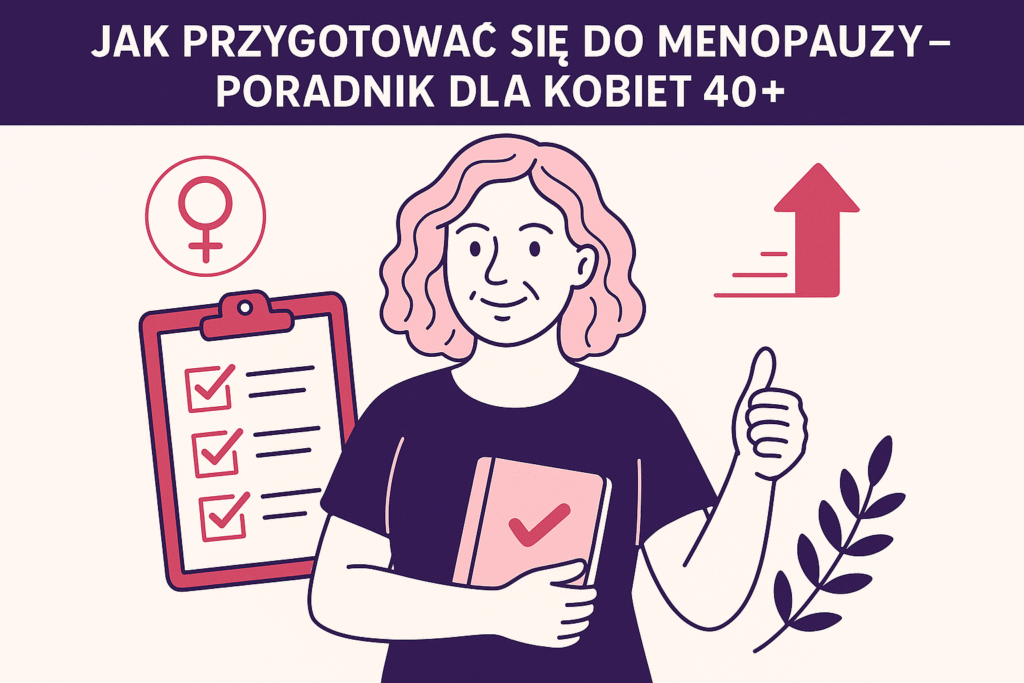Menopause doesn’t happen overnight. It’s a process that can take many years, with the first symptoms often appearing after the age of 40. The transitional stage, called perimenopause, is the perfect time to consciously care for your hormonal, mental, and physical health—before the symptoms become troublesome. This guide offers practical tips on how to prepare for menopause and go through this time with calm, well-being, and energy.
What is perimenopause and when does it start?
Perimenopause is the time before actual menopause, lasting from 2 up to even 10 years. It usually begins between ages 40 and 45, though some women experience symptoms earlier.
During this time:
- menstrual cycles become irregular
- early symptoms of estrogen decline appear (hot flashes, sleep disturbances, mood swings)
- ovarian reserve decreases (lower levels of AMH and estradiol)
- pregnancy is still possible, but fertility is reduced⁽¹⁾
Diagnosis is mostly based on clinical symptoms, but hormonal tests such as FSH, estradiol, AMH, and TSH (to rule out thyroid issues) may be helpful.
Why prepare for menopause in advance?
Early intervention allows you to:
- transition through hormonal changes more smoothly
- maintain a stable weight and metabolism
- prevent osteoporosis and heart disease
- reduce the severity of vasomotor and emotional symptoms
- mentally prepare for a new stage of life
It’s also a great time to adopt a lifestyle that will pay off for decades to come.
Step by step: how to prepare for menopause?
1. Track your body and menstrual cycle
- Record cycle length and symptoms in an app or calendar
- Watch for changes in bleeding (e.g., heavier, lighter, irregular)
- Monitor symptoms like hot flashes, insomnia, mood swings, low libido, dry skin, memory issues
2. Eat a hormone-friendly diet
- Focus on vegetables, legumes, nuts, and whole grains
- Include sources of phytoestrogens (soy, flaxseed, red clover)⁽²⁾
- Ensure intake of calcium, magnesium, zinc, vitamin D, and omega-3s
- Avoid sugar, excess caffeine, processed foods, and alcohol
- Support your microbiome (fermented foods, yogurt, fiber)
3. Move your body – start now before it gets harder
- Exercise at least 3 times a week: walking, swimming, yoga, dancing, strength training
- Resistance training helps prevent muscle loss and osteoporosis⁽³⁾
- Exercise stabilizes mood and improves sleep
4. Sleep better – because sleep regenerates hormones
- Set regular sleep and wake times
- Avoid screens at least 1 hour before bed
- Create a dark, quiet sleep environment
- Consider supplements like melatonin, magnesium, or adaptogens (ashwagandha, rhodiola)
5. Get regular checkups and plan preventive care
After age 40, it’s recommended to do yearly:
- blood count, lipid panel, glucose, insulin
- TSH, FSH, estradiol, AMH (if trying to conceive or symptomatic)
- mammogram or breast ultrasound
- Pap smear, gynecological ultrasound
- bone density scan (if at risk of osteoporosis)⁽⁴⁾
6. Strengthen emotional resilience
- Learn stress management: meditation, yoga, breathing techniques
- Foster relationships, communication, and emotional support
- If you’re experiencing anxiety or depressive symptoms – consider CBT therapy or consult a psychologist⁽⁵⁾
7. Consider early support with supplements or herbs
- Phytoestrogens – soy, clover, flaxseed
- Black cohosh, lemon balm, chasteberry
- Omega-3, vitamin D, B6, magnesium
- Adaptogens – ashwagandha, maca, rhodiola
Consult a doctor or herbalist to choose the right supplements for your needs.
What about fertility?
Pregnancy is still possible during perimenopause, although less likely. If you’re not planning a pregnancy, contraception is still needed until 12 months after your last period. If considering pregnancy after 40, test your ovarian reserve (AMH) and speak to a gynecologist⁽⁶⁾.
Summary
Menopause doesn’t have to be a shock or the end of “youth.” It’s simply the next natural stage—and you can prepare for it well. The key is awareness, prevention, activity, and kindness toward your body. The earlier you care for your hormonal health, the smoother the transition will be, and the easier it will be to maintain your energy, balance, and sense of feminine strength.
References
- Hale GE et al. Perimenopausal transition: endocrine basis and symptoms. Obstet Gynecol Clin North Am. 2009.
- Messina M. Soy and health update. Nutrients. 2016.
- Kohrt WM et al. Physical activity and bone health in women. J Bone Miner Res. 2004.
- Kanis JA et al. European guidance on the diagnosis and management of osteoporosis in postmenopausal women. Osteoporos Int. 2019.
- Freeman EW. Mood and anxiety disorders associated with the menopausal transition. Am J Psychiatry. 2010.
- Broer SL et al. Anti-Mullerian hormone: ovarian reserve testing and its potential clinical implications. Hum Reprod Update. 2014.

